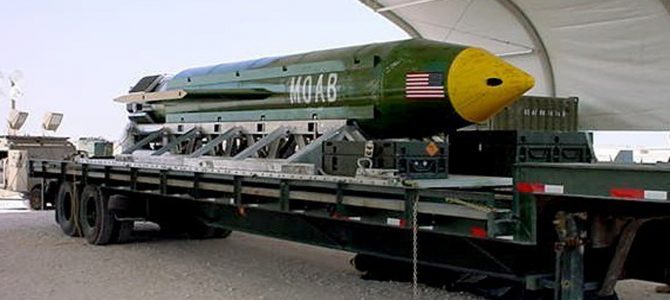
The United States bombs a country’s airfield, and the president whom Washington’s foreign policy community once universally considered to be a lemon is now credited with being a resolute commander-in-chief who faced down an atrocity with flying colors. A headline in the Huffington Post couldn’t have summarized this dynamic better: “Cable News Praises Trump on Syria, Because Bombing Stuff is ‘Presidential.’”
Blowing up a couple dozen planes from a war criminal’s arsenal makes us all feel good for a few days, especially if it’s in retaliation for a horrible war crime against innocent men, women, and children. Outside of a shot across the dictator’s bow, however, serious observers of world affairs are having a very difficult time explaining what strategic effects the missile attack on a Syrian military airport had.
There certainly hasn’t been any tactical effect—a fleet of combat jets that dropped the sarin gas on a small town in northwestern Syria was up and running a few hours after the strike happened. That the Assad regime felt comfortable bombing the same town and taking off from the same airfield is all the evidence one needs to successfully argue the deterrent impact of last weeks’ operation was minimal.
Assad may think twice about using chemical weapons again — although human rights activists have already reported that Syrian pilots are resuming air operations with chlorine munitions — but Damascus doesn’t need to use those weapons to prosecute the war.
Is President Trump prepared to launch additional military strikes on Syria if barrel bombs continue to rain on opposition neighborhoods, killing 50 to 100 civilians at a clip? And if not, how exactly did the Tomahawk missile attack do anything to help decrease the violence, let alone end the war?
Despots Aren’t Afraid of Missiles Aimed at Weak Dictators
The Trump administration clearly believes the strike on the Sharyat airfield will send Bashar al-Assad a clear warning: Use chemical weapons again at your own risk. But Secretary of State Rex Tillerson is taking that belief one step further, claiming that the attack last week will have a wide-ranging impact on the world’s other despots.
“The message that any nation can take,” Tillerson told ABC News, “is [i]f you violate international norms, if you violate international agreements, if you fail to live up to commitments, if you become a threat to others, at some point a response is likely to be undertaken.” It’s much the same logic the Bush administration used after the invasion of Iraq, when neoconservatives in Washington said Saddam’s downfall would force countries like Iran and North Korea to either ship up or shape out.
This is a comfortable argument to buy into because it suggests the United States is an all-powerful force that can coerce other nations to act in accordance with American values. Yet there are several issues with that belief, a big one being that different leaderships react in different ways to the same events, as no government has identical national interests.
If Tillerson, for instance, thinks sending several dozen Tomahawk missiles into a Syrian airfield will convince Kim Jong-un to magically see the light and eliminate Pyongyang’s nuclear weapons programs out of fear or desperation, he severely overestimates Washington’s ability to frighten other nations from doing what they perceive to be in their best interest.
Therein lies one of the major problems with President Trump’s decision to use military force against the Syrian government: It reinforces to other nations like Iran, Russia, China, and North Korea that their working assumptions about the United States are correct. Instead of changing how they do business, these governments are reassured that the policies that they’re pursuing should not only continue, but be better resourced.
Aggression Can Also Escalate Aggression
North Korea and China are perfect case studies on how military action in Syria may reverberate in other areas of the world.
”The reality of today,” a North Korean government official told the state news media, “shows that we must stand against power with power and it proves a million times over that our decision to strengthen our nuclear deterrence has been the right choice…Only military power of our own will protect us from imperialistic aggression.”
Pyongyang is clearly using the attack in Syria last week to reaffirm a belief its leadership has had about the United States for seven decades: that they are still in the regime change business, are scheming behind the scenes, and have no compunction or hesitation with dropping a several dozen bombs on a sovereign nation’s air base. To Pyongyang, the events of last week are a godsend — a justification in real time of the reasons North Korea must not contemplate any arrangement that results in eliminating their nukes.
Chinese analysts have a somewhat different perspective. Shen Dengli, a professor at Fudan University, summed it up this way: “If the United States gets trapped in Syria, how can Trump make America great again? As a result, China will be able to achieve its peaceful rise…Even though we say we oppose the bombing, deep in our hearts we are happy.”
The view from Beijing, rather than fear at what the Syria attack portends for the future of North Korea, is one of encouragement and endless possibilities — let the United States get bogged down in another Middle Eastern sandpit, because Beijing will then be able to assert itself in the Asia-Pacific with minimal U.S. pushback.
Trump’s decision to use force in Syria last week is instructive: The rule of unintended consequences is alive and well in international politics. Decisions powered by emotion to accomplish a short-term objective can have long-term ramifications.









